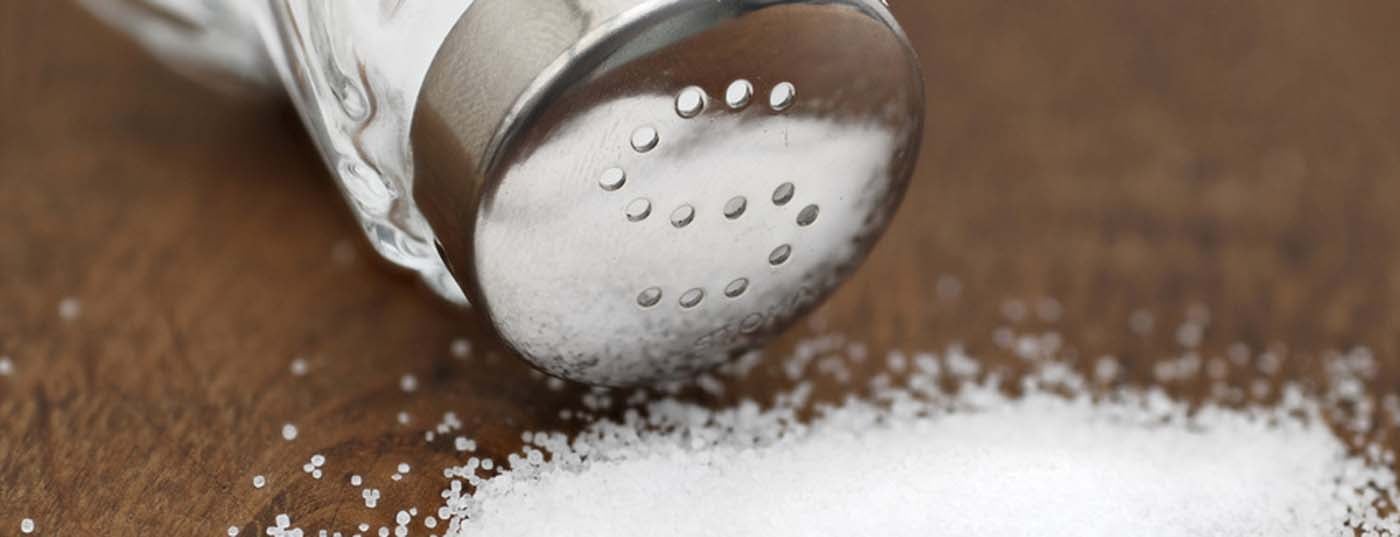The benefit of salt restriction in arterial hypertension has been controversial for many years. About half of hypertensives and just under one-third of normotensives are salt sensitive. Increased salt intake promotes an increase in blood pressure via sodium and water retention. According to studies, salt restriction leads to a reduction in systolic and diastolic blood pressure, a decrease in albuminuria, and progression of existing renal insufficiency. ESH and ESC guidelines recommend salt restriction to 5-6 g/day. A diet low in sodium and high in potassium (with fruits and vegetables) has beneficial effects on blood pressure and reduces the incidence of cardiovascular events.
The “white gold” was already used in the Middle Ages not only as a preservative, but also as a spice, traded over salt roads and widely distributed. Salty taste perception occurs via the lateral parts of the tongue. It is genetically determined, interindividually variable, and conditionable by dietary habits already in childhood [1]. Salt as a seasoning enhances the flavors of food and, accordingly, low-salt foods are perceived as bland by many people. High salt consumption leads to an increase in serum osmolarity and, depending on the amount, also to an imperative feeling of thirst (which restaurateurs appreciate due to higher sales!). Many doctors recognize health risks in excessive salt consumption. The benefits of a salt-reduced diet will be presented here in terms of blood pressure and cardiovascular effects.
Aspects of the debate on salt restriction
The question of whether salt restriction is worthwhile in arterial hypertension has been the subject of controversy among physicians in various fields for many years. Many studies in this regard have methodological weaknesses.
Cardiologists see an association between increased salt intake and blood pressure in terms of long-term development of arterial hypertension with consecutive left ventricular hypertrophy and heart failure, although prospective prognostic studies with therapeutic reduction of salt consumption are not available [2].
Neurologists recognize excessive salt consumption as a vascular risk factor with regard to apoplexy with increased mortality. They consider arterial hypertension and salt-mediated accentuation to be the dominant pathogenetic factor with functional and structural changes in the arterial wall [3]. Long-term high salt consumption leads to endothelial dysfunction and stiffening of arterial walls, mediated by increased oxidative stress, decreased free radical scavenging, decreased nitric oxide bioavailability, and weaker vasodilatory response of nitric oxide [4].
About half of hypertensives and almost one-third of normotensives respond to a restriction of salt intake by lowering blood pressure and are thus termed salt-sensitive. At risk for increased salt sensitivity are elderly patients, hypertensives, obese, patients with renal insufficiency, and non-Caucasians. Determinants of salt sensitivity are expansion of extracellular volume and stimulation of sympathetic nervous system [5]. The so-called salt blood test is based on the sedimentation of erythrocytes in two electrolyte solutions of different sodium concentrations, which can be used to determine erythrocyte salt sensitivity in vitro [6–8].
Total body water and body sodium levels play a central role in the regulation of blood pressure and in hypertension development. From a nephrological point of view, increased salt intake via sodium and water retention promotes an increase in blood pressure and can be the cause of arterial hypertension. In addition, excessive salt consumption plays a role in the genesis of kidney stones [9]. Increasing sodium intake both experimentally and clinically results in an acute or permanent increase in blood pressure [10]. Thus, it has been shown that doubling salt intake from 5 to 10 g/24 hours can lead to a passive and to an adaptive increase in extracellular volume by 1-1.5 liters [11]. The handling of a salt-mediated increase in serum osmolarity with secondary expansion of extracellular volume is complex in vivo by renal and other such as neurohumeral mechanisms. Currently, a macrophage-mediated dermal regulation of sodium homeostasis is also discussed: Macrophages appear to regulate blood volume via lymphatic channels in a salt-dependent manner [12].
Sodium and potassium exert vasomotor effects by influencing smooth muscle cells, i.e. sodium has a vasoconstrictor effect here at the cellular level, while potassium has a vasodilator effect, which explains a favorable influence of potassium-containing foods (vegetables and fruits) [13].
Study situation and guidelines
The experts of the K-DIGO initiative identified evidence-based 16 studies on reduced salt intake as informative and found a reduction in systolic and diastolic blood pressure, a decrease in albuminuria, and a progression inhibition of existing renal insufficiency by salt restriction [14].
Epidemiologists consider the main benefit of a moderate reduction in salt consumption to be a decrease in morbidity and mortality from cardiovascular disease by lowering arterial blood pressure [15].
In 2013, the authors of the Task Force for the Management of Arterial Hypertension of the European Society of Hypertension (ESH) and of the European Society of Cardiology (ESC) recommended salt restriction to 5-6 g/day in their guidelines [16]. They refer to studies that a reduction in daily salt intake from the usual 9-12 in Europe to 5 g/day has a moderate blood pressure-lowering effect of 1-2 mmHg in the normotensive population and a more pronounced effect in hypertensives of 4-5 mmHg [17].
A recent study suggests that either the different mode of action of aldosterone or directly a reduction in added salt during pregnancy leads to the reduction in blood pressure [18].
The Federal Food Safety and Veterinary Office is pursuing a salt strategy with a reduction in daily table salt consumption from the current level of around 9-10 to 8 g/day by 2016, following the recommendations of the Federal Nutrition Commission. The long-term goal is salt restriction to less than 5 g/day [19].
Salt restriction, what does it mean for practice?
The healthy kidney glomerularly filters about 25,000 mmol of sodium per day and reabsorbs most of it in the proximal tubule to excrete only 200 mmol/day of it in the urine [20]. The amount of sodium chloride consumed can be assessed by measuring it in 24-hour urine and over time. In the case of a high sodium intake determined in this way, the effect of a salt-reduced diet on the patient’s blood pressure can be directly observed.
The blood pressure reduction achieved by salt restriction should not be overestimated – for example, depending on the study, it is about 4.0/2.0 mmHg in hypertensives and 1.5/0.7 mmHg in normotensive subjects [5]. In severe refractory arterial hypertension, an additive blood pressure-lowering effect can be achieved by salt restriction in the order of 20/10 mmHg [10,21].
Diuretics negatively affect tubular sodium reabsorption. Diuretics are saluretics and result in salt-mediated renal efflux of excess water. Almost all antihypertensives can be combined with diuretics, depending on renal function and concomitant circumstances, which exert an additive antihypertensive effect.
In conclusion, a low-sodium and high-potassium diet (fruits and vegetables) favorably affects blood pressure and reduces the incidence of cardiovascular events.
A Provençal diet book from the Middle Ages even ranks salty food among the most important causes of premature death, because it has the same effect as “anger, pain (…), hard and bad-tasting bread, sour wine (…) and a quarrelsome wife” [22].
Acknowledgments: I would like to thank Georg Meffert, MD, specialist in general internal medicine and nephrology, Bern, for his critical review of the manuscript.
Literature:
- Lava SAG, et al: Salt consumption in children. Switzerland Med Forum 2014; 14(10): 191-194.
- Cuculi F, et al: Salt and cardiovascular disease or salt and heart failure – a question of measure. Switzerland Med Forum 2014; 14(8): 143-145.
- Goeggel Simonetti B, et al: Salt and cerebral stroke. Switzerland Med Forum 2014; 14(5): 73-74.
- Hayoza D, Haesler E: Salt and vascular function. Switzerland Med Forum 2014; 14(6): 97-99.
- Suter P, Conen D: Salt and nutrition. Switzerland Med Forum 2014; 14(9): 168-170.
- Oberleithner H: Salt sensitivity in humans: A simple blood test for quantification. NEPHRO-news, Forum for Nephrology and Hypertensiology 2013; 15(4).
- Oberleithner H, Wilhelmi M: Determination of erythrocyte sodium sensitivity in man. Ploughman’s Arch 2013; 465: 1459-1466.
- Oberleithner H: Vascular endothelium: a vulnerable transit zone for merciless sodium. Nephrol Dial Transplant 2014; 29: 240-246.
- Cappuccio FP: Cardiovascular and other effects of salt consumption. Kidney International Supplements 2013; 3: 312-315.
- Burnier M, Wuerzner G, Bochud M: Salt consumption and arterial hypertension. Switzerland Med Forum 2014; 14(11): 218-220.
- Antonios TF, MacGregor GA: Salt-more adverse effects. Lancet 1996; 348(9022): 250-251.
- Pechère-Bertschi A: Arterial blood pressure and regulation of blood volume. Switzerland Med Forum 2014; 14(22-23): 445-448.
- Adrogue HJ, Madias NE: Sodium and Potassium in the Pathogenesis of Hypertension. N Engl J Med 2007; 356: 1966-1978.
- KDIGO, www.kdigo.org
- Bochud M, Burnier M: Salt and cardiovascular risk: evidence from epidemiological studies. Switzerland Med Forum 2014; 14(7): 119-121.
- 2013 ESH/ESC Guidelines for the management of arterial hypertension, The Task Force for the management of arterial hypertension of the European Society of Hypertension (ESH) and of the European Society of Cardiology (ESC). Journal of Hypertension 2013; 31: 1281-1357.
- Dickinson HO, et al: Lifestyle interventions to reduce raised blood pressure: a systematic review of randomized controlled trials. J Hypertens 2006; 24: 215-233.
- Gennari-Moser C, et al: Normotensive Blood Pressure in Pregnancy: The Role of Salt and Aldosterone. Hypertension 2014 Feb; 63(2): 362-368.
- Michael Beer: The Salt Strategy of the Federal Food Safety and Veterinary Office. Switzerland Med Forum 2014; 14(4): 48.
- Külpmann WR, Stummvoll HK, Lehmann P: Clinic and laboratory: electrolytes, acid bases, and blood gases. Springerverlag 2002.
- Pimenta E, et al.: Effects of dietary sodium reduction on blood pressure in subjects with resistant hypertension. Results from a randomized trial. Hypertension 2009; 54: 475-481.
- Bergier JF: The story of salt. Campus Verlag Frankfurt/New York 1989.
CARDIOVASC 2014; 13(6): 6-11











